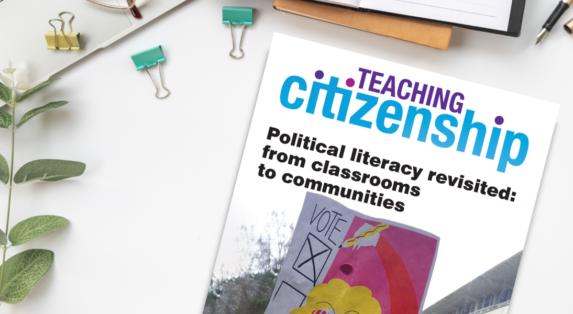
So Year 8, what is the best way to run a country?
In this case study Ryan Mason shares his thoughts on tackling some challenging political literacy issues head on in year 8


Meet the author
Ryan is Curriculum Leader for Humanities at Addey and Stanhope School. He is a trained Citizenship teacher and has been leading the subject and teaching Citizenship explicitly in the curriuclum for over ten years. Ryan has been involved in working with ACT and contributed to national curriculum development projects. Ryan’s approach to teaching the subject has been positively recognised by Ofsted.
After nearly a decade of teaching these topics, Ryan Mason has established that students have an appetite for learning this core knowledge.
Setting the scene
This scheme of work is the first topic we consider in year 8, and it introduces the theme for the year: politics and power. It is the first time we consider political ideas so explicitly as in year 7 the lessons tend to be issue led and focused on change in the local area.
I used to launch straight into teaching about Westminster politics and institutions but I found myself constantly responding to questions about basic ideas and concepts. My wife is a science teacher and we discussed how she plans units to ensure that there is clear progression, so some topics are obviously placed before others, where the information from earlier units is required to understand later units. I thought about how I might apply that concept to citizenship and devised this series of lessons to try to explicitly introduce some key ideas and vocabulary early on that would repeatedly crop up in the later topics. This helped massively, especially building a firm foundation for the GCSE units on politics. It has also helped that I have a head who is supportive of the subject and encourages me to push students with their understanding of their local and wider political context.
Now I’ve taught it for a few years I think the scheme of work is important for three reasons. First, it enables us to start by getting down to the big question that lurks in the background – why is politics important? This helps me to tackle head on how politics (and politicians) have an impact on all aspects of our lives. Second, our school is incredibly diverse and students have connections to, and are familiar with, countries all around the world. By considering how different countries are run, this provides a citizenship language for students to describe the differences they have already seen. Third, introducing the left-right ideological continuum is essential for students to begin to think about why politicians make different decisions. For example, later on when we look at the welfare state, this is really important for understanding the decisions governments make.
I’ve noticed over the years that teachers in subjects like science and maths are much happier with the idea that they may have to come back and reteach content at various points, for example, no maths teacher expects everyone to have mastered algebra after the first attempt.
Of course, some of these big ideas are challenging, but I firmly believe there are effective ways for experienced teachers to engage students in meaningful learning. For example, sharing a bag of sweets in different ways is an obvious way in to illustrate different decision making approaches. It’s a short step from there to talk about democracy and dictatorship. I’ve noticed that some student teachers really struggle with this and try to foreground definitions of the concepts. We need to have high expectations but we also have to remember this is not A level politics. I have also come to accept the fact that some students are ready to engage with these ideas and can launch into sophisticated arguments straight away. For others, this is just the beginning of establishing those key ideas as usable concepts. I’ve noticed over the years that teachers in subjects like science and maths are much happier with the idea that they may have to come back and re-teach content at various points, for example, no maths teacher expects everyone to have mastered algebra after the first attempt. Humanities teachers need to embrace that, rather than assume content needs to be simplified so that everyone grasps everything first time around.
I have taught this scheme of work for nine years and supported many student teachers to engage with these topics. My main advice is not to be scared of what may seem like ‘dry’ or difficult topics. Think about your students and shape the activities around their experiences and interests. Finding the right hook can ensure this is relevant, accessible and exciting for students.
Lesson 1: Why should I care about politics?
I think of this as my attempt to nip in the bud any complaints that politics is irrelevant or boring.
- Starter: students write down everything they know about politics.
- Test the teacher: Ask students to come up with anything that might seem unpolitical (some challenging examples have included toothpaste and eyebrows) and the teacher explains how each has a political dimension. Students love this and I sometimes have year 8 running up to me at break to test another idea (the most difficult one was ‘sleep’).
- Student activity: Students read through a set of cards of various activities and explain what impact politics has on their life. They often end up focusing on food – a key interest for most adolescents! They are often very interested in the food hygiene ratings of their local takeaways.
- Just a minute plenary: three students (top/middle/bottom) explain in one minute how politics impacts Mr Mason’s life.
Lesson 2: What is power?
This lesson moves us on to clarify that politics is power, but that is always in a specific situation and context.
- Think, Pair, Share: What does the word power mean? Who has power?
- Teacher uses pictures of the head teacher and Prime Minister to discuss the differences in power. Then prompts students to think about who has power in their lives on a day to day basis. This draws out the point that power is relational and situated. We also talk about who really has the power in this classroom. Their first response is the teacher, but then they realise that the teacher relies on the students choosing to respond in certain ways.
- Class read pages 24-25 of Marr’s ‘All about politics’ and answer the following questions: What is sovereignty? What power does a sovereign have? Why does land equal power? What is a sovereign state?
- Class discussion: Do we need someone in charge? For/Against/Conclusion.
- Plenary: Think, pair, share the meaning of the saying, ‘Power corrupts; absolute power corrupts absolutely.’ Having considered the power of the head teacher, who clearly has their best interests at heart, this helps students resist simplistic judgements that all power corrupts.
Lesson 3: What is the difference between a democracy and dictatorship?
The next few lessons may feel a bit laboured but I have found that getting these terms established early on actually saves me a lot of time later. It also helps to ensure that the specialist words don’t put students off when they encounter them later on.
- Starter: what freedoms/rights do you have in the UK?
- Introducing democracy: Teacher chooses 3 students who explain how they would distribute a bag of sweets and students vote on who they choose. Teacher talks about what just happened and explains how it is / not democratic.
- Teacher talk: explain and contrast democracy and dictatorship. Then teacher gives the student who won the sweets the ability to eat and no one else in class can touch the sweets, demonstrating the power of a dictator.
- Students answer the following questions peer assess answers: What is a democracy? What is a dictatorship? Would you prefer to live in a democracy or dictatorship?
- Students start answering the question ‘Is our school a democracy or dictatorship?’ Complete for homework.
Lesson 4: What is a theocracy?
A lot of our students are religious, especially Christian. I try to engage with that by considering possible rules that someone might isolate from reading the Bible.
- Starter: Could you abide by the following rules? Do not wear jewellery. Never get a tattoo. Never eat seafood. Never cut your facial hair.
- Teacher discussion around rules in the bible and difficulty of following religious laws.
- Class read of pages 36-37 of Marr’s ‘All about politics’, and answer the following questions: What is a theocracy? What was the age of enlightenment? What is a secular state? What countries/states operate a system of theocracy?
- Class discussion: Could the UK be a theocracy? Push students to give a balanced answer with reasons.
Lesson 5: What is anarchy?
We start by discussing what students would do if all the rules in our society were suspended. This helps to open up thinking about human nature as well, by talking about some of the anti-social urges that emerge from that opening discussion. I remember some unfortunate behaviour management problems that followed after a student teacher had got the students slightly too enthusiastic about overthrowing all rules and authority, so I’m careful to introduce a note of caution to the lesson! In terms of setting the scene for citizenship, this is also another opportunity to establish why government and the rule of law are useful and to consider what the alternatives might be.
- Students are shown four pictures of the London riots and asked: What is happening in the pictures? What do you think led to this?
- Class read pages 44-45, of Marr’s ‘All about politics’, and answer the following questions: What does the word Anarchy mean? What do Anarchists believe? What are the 6 elements of Anarchy?
- Class discussion: Could the UK ever be an Anarchy? Push students to give a balanced answer with reasons.
I remember some unfortunate behaviour management problems that followed after a student teacher had got the students slightly too enthusiastic about overthrowing all rules and authority, so I’m careful to introduce a note of caution to the lesson on anarchism!
Lesson 6: Political ideology
Students really enjoy this lesson as it gives them a powerful language to describe different beliefs and situate different political actors. It also helps them to situate and describe their own developing political ideas.
- Teacher discussion around ISM and CRACY
- Class read of pages 52-53 of Marr’s ‘All about politics’, and answer the following questions in groups: Explain the ideals rainbow in your book. Explain the difference between left and right wing (use left/right values).
- Class read of pages 54-55 and students decide if they identity more with left or right wing ideas and give at least 3 reasons.
- Extension: Why might it be difficult to say you are one side or the other?
- Plenary: Be the teacher – students ask questions of each other.
Assessment
Essay: What is the best way to run a country?
Obviously this is potentially huge but it works as a diagnostic opportunity at a number of levels. First I can check they are using the specific terms correctly and relating them to each other appropriately (e.g. not advocating fascist-democracy). Second, I can think about how they apply those ideas to the situations they discuss (e.g. Somali students have written in the past about how it could be seen that their country slid into anarchy after/during the civil war, others talk about how Hitler demonstrates the transition from democracy to dictatorship). I provide a structure to guide them:
- Paragraph 1: Start by discussing some key terms you have learned about.
- Paragraph 2: Write about a good way of running a country and use an example.
- Paragraph 3: Write about a bad way of running a country and use an example.
- Paragraph 4: Write about your own views and explain them.
It has always been interesting to me that most of our students give quite individualistic and conservative arguments. They know I do not pass judgement on their views when marking, but focus on checking their understanding and gauging their level of interest.

